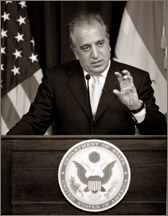Ambassador calls for national reconciliation
|

The departing U.S. ambassador to Iraq Zalmay Khalilzad gestures
during a press conference in the heavily fortified Green Zone in
Baghdad.
-AP
|
The outgoing US ambassador to Iraq yesterday delivered a blunt
farewell message to Iraq's leadership, saying the Bush administration's
patience was wearing thin and urging them to stem the bloodshed.
Zalmay Khalilzad, who is due to leave today after 21 months in Iraq,
said that despite encouraging results from the US-Iraqi security plan,
which had reduced attacks by 25% in its first six weeks, "there is a lot
more that needs to be done."
He said: "Success requires Iraq and Iraqi leaders to make the
compromises necessary to reduce the sources of violence."
Mr Khalilzad also confirmed reports that US and Iraqi officials were
talking to insurgent groups and tribes in the volatile Sunni areas in an
attempt to draw them away from violence and isolate foreign jihadi
groups such as al-Qaida.
At a final news conference in Baghdad, the Afghan-born diplomat
warned of the growing pressure in the US to commit to a timetable for a
withdrawal of troops.
"I know that we are an impatient people, and I constantly signal to
the Iraqi leaders that our patience, or the patience of the American
people, is running out," said Mr Khalilzad, who has been nominated by
Presdient Bush to succeed John Bolton as America's envoy to the UN.
He insisted, however, that the country was heading in the right
direction and success was still "possible". He said Iraq's government
must expedite the passage of the new hydrocarbons law that would provide
a fair distribution of oil revenues among ethnic and sectarian groups.
Swift action was also needed on political and sectarian
reconciliation between Sunni and Shia Arabs. Key to this, he said, was
amending the constitution to make it more acceptable to the Sunnis,
dismantling the militias, and a controversial new de-Ba'athification
law, which aims to encourage former low-ranking Ba'ath party members to
join the political process.
American and Iraqi officials were also trying to convince so-called
"reconcilable insurgents" to unite against al-Qaida in Iraq and other
Islamist militant groups. "We have had discussions with those groups,"
Mr Khalilzad said.
"They are continuing to take place and I think one of the challenges
is how to separate more and more groups away from al-Qaida."His comments
followed an interview with the New York Times yesterday, in which the
departing ambassador revealed he had talked with nationalist insurgents
in the Jordanian capital in early 2006.
The paper also quoted an unnamed US official as doubting whether the
people that Mr Khalilzad met were important.
During his 21-month stint in Baghdad, Mr Khalilzad's attempts to
reach out to Iraq's once all-powerful Sunni minority won praise.
Yet his tenure coincided with a catastrophic rise in violence that
brought the country to the brink of all-out civil war. Meanwhile, Iraq's
post-Saddam political elite struggled to extend their influence beyond
Baghdad's Green Zone.
Industry minister Fawzi Hariri said: "We can't say Iraq is better
after his term, but believe me it could have been a lot, lot worse."
Mr Khalilzad listed as his accomplishments the drafting of a
constitution, the participation of all Iraqis in a second round of
elections and the tortuous formation of a national unity government led
by the prime minister, Nouri al-Maliki.
But what one commentator dubbed his "hug a Sunni" policy aroused the
suspicion of Iraq's newly empowered Shia majority.
Adnan al-Radam, a member of the Supreme Council for Islamic
Revolution in Iraq, which leads the ruling Shia alliance, said the
incoming ambassador, Ryan Crocker, was a Christian, "whom one would
expect to be more neutral".
Guardian Unlimited
|
